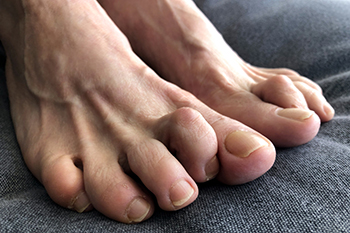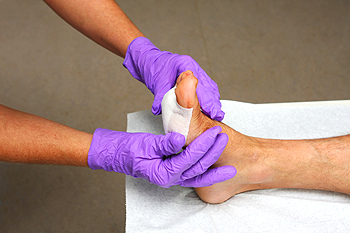Connect With Us
Blog
Items filtered by date: November 2024
A Look at Crooked Toes

Crooked toes, such as hammertoe, claw toe, and mallet toe, are deformities that cause the toes to bend abnormally. Hammertoe involves a middle joint that bends downward, while claw toe affects both joints, causing the toe to curl downward like a claw. Mallet toe is similar to hammertoe but affects only the joint closest to the toenail, causing it to bend down. Common symptoms include pain, difficulty walking, corns, and calluses on the tops of or between the toes. Wearing tight footwear often worsens these conditions. Relief and treatment options include wearing properly fitted shoes, using orthotics, and performing toe-stretching exercises. In more severe cases, a podiatrist may recommend splints, targeted exercises, or surgery to straighten the toes. If you have crooked toes and is causing pain or discomfort, it is suggested that you schedule an appointment with a podiatrist to receive an accurate diagnosis and explore treatment options.
Hammertoes can be a painful condition to live with. For more information, contact one of our podiatrists of Foot & Ankle Associates of Maine. Our doctors will answer any of your foot- and ankle-related questions.
Hammertoe
Hammertoe is a foot deformity that occurs due to an imbalance in the muscles, tendons, or ligaments that normally hold the toe straight. It can be caused by the type of shoes you wear, your foot structure, trauma, and certain disease processes.
Symptoms
- Painful and/or difficult toe movement
- Swelling
- Joint stiffness
- Calluses/Corns
- Physical deformity
Risk Factors
- Age – The risk of hammertoe increases with age
- Sex – Women are more likely to have hammertoe compared to men
- Toe Length – You are more likely to develop hammertoe if your second toe is longer than your big toe
- Certain Diseases – Arthritis and diabetes may make you more likely to develop hammertoe
Treatment
If you have hammertoe, you should change into a more comfortable shoe that provides enough room for your toes. Exercises such as picking up marbles may strengthen and stretch your toe muscles. Nevertheless, it is important to seek assistance from a podiatrist in order to determine the severity of your hammertoe and see which treatment option will work best for you.
If you have any questions, please feel free to contact our office located in Brunswick, ME . We offer the newest diagnostic and treatment technologies for all your foot care needs.
Characteristics of Non Diabetic Foot Ulcers

Non-diabetic foot ulcers are open sores or wounds that can develop on the feet due to various factors, including poor circulation, pressure injuries, or skin conditions like eczema. They can also result from traumatic injuries, prolonged friction from ill-fitting shoes, or neuropathy. Symptoms often include redness, swelling, pain around the ulcer, and possible drainage or foul odor. If left untreated, these ulcers can lead to infections or serious complications. A podiatrist can play a critical role in diagnosing and treating non-diabetic foot ulcers. They will assess the ulcer’s condition and underlying causes, often recommending a combination of treatments. In some cases, advanced therapies like skin grafting or specialized dressings may be necessary. Recovery can vary based on the ulcer's severity. If you or someone you know has a foot ulcer, it is suggested that you make an appointment with a podiatrist for proper evaluation and treatment.
Wound care is an important part in dealing with diabetes. If you have diabetes and a foot wound or would like more information about wound care for diabetics, consult with one of our podiatrists from Foot & Ankle Associates of Maine. Our doctors will assess your condition and provide you with quality foot and ankle treatment.
What Is Wound Care?
Wound care is the practice of taking proper care of a wound. This can range from the smallest to the largest of wounds. While everyone can benefit from proper wound care, it is much more important for diabetics. Diabetics often suffer from poor blood circulation which causes wounds to heal much slower than they would in a non-diabetic.
What Is the Importance of Wound Care?
While it may not seem apparent with small ulcers on the foot, for diabetics, any size ulcer can become infected. Diabetics often also suffer from neuropathy, or nerve loss. This means they might not even feel when they have an ulcer on their foot. If the wound becomes severely infected, amputation may be necessary. Therefore, it is of the upmost importance to properly care for any and all foot wounds.
How to Care for Wounds
The best way to care for foot wounds is to prevent them. For diabetics, this means daily inspections of the feet for any signs of abnormalities or ulcers. It is also recommended to see a podiatrist several times a year for a foot inspection. If you do have an ulcer, run the wound under water to clear dirt from the wound; then apply antibiotic ointment to the wound and cover with a bandage. Bandages should be changed daily and keeping pressure off the wound is smart. It is advised to see a podiatrist, who can keep an eye on it.
If you have any questions, please feel free to contact our office located in Brunswick, ME . We offer the newest diagnostic and treatment technologies for all your foot care needs.
Relief From Foot Stress Fractures

A foot stress fracture is a small crack in a bone commonly caused by repetitive force or overuse. Symptoms often include localized pain that worsens with activity and improves with rest. Swelling and tenderness in the affected area may also be present, making it difficult to walk or engage in physical activities. The primary causes of foot stress fractures include sudden increases in exercise intensity, wearing inadequate footwear, and poor biomechanics. To find relief, it is essential to rest and elevate the affected foot when possible. Mild pain medications can help manage discomfort. Seeking medical advice from a podiatrist for a proper diagnosis is vital, as it may involve imaging tests to assess the severity of the fracture. If you have symptoms of a foot stress fracture, it is suggested that you contact a podiatrist who can properly treat this condition.
Stress fractures occur when there is a tiny crack within a bone. To learn more, contact one of our podiatrists from Foot & Ankle Associates of Maine. Our doctors can provide the care you need to keep you pain free and on your feet.
How Are They Caused?
Stress fractures are the result of repetitive force being placed on the bone. Since the lower leg and feet often carry most of the body’s weight, stress fractures are likely to occur in these areas. If you rush into a new exercise, you are more likely to develop a stress fracture since you are starting too much, too soon. Pain resulting from stress fractures may go unnoticed at first, however it may start to worsen over time.
Risk Factors
- Gender – They are more commonly found in women compared to men.
- Foot Problems – People with unusual arches in their feet are more likely to develop stress fractures.
- Certain Sports – Dancers, gymnasts, tennis players, runners, and basketball players are more likely to develop stress fractures.
- Lack of Nutrients – A lack of vitamin D and calcium may weaken the bones and make you more prone to stress fractures
- Weak Bones – Osteoporosis can weaken the bones therefore resulting in stress fractures
Stress fractures do not always heal properly, so it is important that you seek help from a podiatrist if you suspect you may have one. Ignoring your stress fracture may cause it to worsen, and you may develop chronic pain as well as additional fractures.
If you have any questions, please feel free to contact our office located in Brunswick, ME . We offer the newest diagnostic and treatment technologies for all your foot care needs.
Gout Pain Can Be Managed
Various Causes of Foot Cramps

Foot cramps can be both painful and disruptive, often stemming from a variety of factors. One common cause is wearing tight shoes, which can constrict blood flow and lead to muscle spasms. Overexertion during physical activities can also trigger cramps, particularly if the muscles are not adequately conditioned or warmed up. Dehydration is another significant factor, as insufficient fluid intake can disrupt electrolyte balance, resulting in cramping. Low levels of potassium, an essential mineral for muscle function, can further contribute to the issue, leading to increased susceptibility to cramps. Foot cramps can be uncomfortable and can cause difficulty in completing daily activities. If this is a common occurrence for you, it is suggested that you consult a podiatrist to find the cause, followed by treatment options.
Foot Pain
Foot pain can be extremely painful and debilitating. If you have a foot pain, consult with one of our podiatrists from Foot & Ankle Associates of Maine. Our doctors will assess your condition and provide you with quality foot and ankle treatment.
Causes
Foot pain is a very broad condition that could be caused by one or more ailments. The most common include:
- Bunions
- Hammertoes
- Plantar Fasciitis
- Bone Spurs
- Corns
- Tarsal Tunnel Syndrome
- Ingrown Toenails
- Arthritis (such as Gout, Rheumatoid, and Osteoarthritis)
- Flat Feet
- Injury (from stress fractures, broken toe, foot, ankle, Achilles tendon ruptures, and sprains)
- And more
Diagnosis
To figure out the cause of foot pain, podiatrists utilize several different methods. This can range from simple visual inspections and sensation tests to X-rays and MRI scans. Prior medical history, family medical history, and any recent physical traumatic events will all be taken into consideration for a proper diagnosis.
Treatment
Treatment depends upon the cause of the foot pain. Whether it is resting, staying off the foot, or having surgery; podiatrists have a number of treatment options available for foot pain.
If you have any questions, please feel free to contact our office located in Brunswick, ME . We offer the newest diagnostic and treatment technologies for all your foot care needs.

